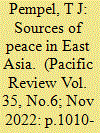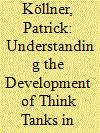| Srl | Item |
| 1 |
ID:
187396


|
|
|
|
|
| Summary/Abstract |
For forty years, the East Asian regional order has delivered widespread peace and prosperity. That order faces possible upending by an economically and militarily more powerful China and a decreasingly robust and engaged United States. While accepting the possibility that such structural shifts could upend the regional order, this paper contends that three powerful counterweights are working to counter disruptive conflicts and to foster peaceful change, namely strong and rising economic interdependence, expanding institutionalization, and active preservation efforts by number of other Asian states, particularly the region’s middle powers. This article analyzes the contribution of these three forces to creating the existing order and to their roles in its continuation.
|
|
|
|
|
|
|
|
|
|
|
|
|
|
|
|
| 2 |
ID:
158495


|
|
|
|
|
| Summary/Abstract |
Many new think tanks have emerged in East Asia in recent decades. The region is home to highly diverse and in some cases very vibrant environments for think-tank development. While there are some commonalities among think tanks in East Asia in terms of the models used at the time of their establishment, there is no uniform pattern of think-tank development in the region that can be traced back to the operations of developmental states. This Special Issue explores the driving forces of and the challenges to think-thank development in three specific East Asian settings: Mainland China, Taiwan, and Japan. In particular, the experience with think-tank development in Mainland China raises the necessity of reconsidering prevailing conceptions that think tanks can only prosper in democracies and when they are independent of the government.
Two broad conclusions emerge from this Special Issue. First, the contributions emphasize that context matters for think-tank development and, more specifically, that national think-tank sectors are greatly influenced by the particular political context in which they exist. Second, the contributions show not only that the specific political context factors that impact the trajectories and traits of East Asian think-tank sectors vary between countries, but also that they operate at different interactive levels: (a) at the level of the inter- and transnational context within which think-tank sectors develop; (b) at the level of domestic governmental systems and their openness to external policy advice and other think-tank services; and (c) at the level of individual political leaders interested in engaging with think tanks.
|
|
|
|
|
|
|
|
|
|
|
|
|
|
|
|